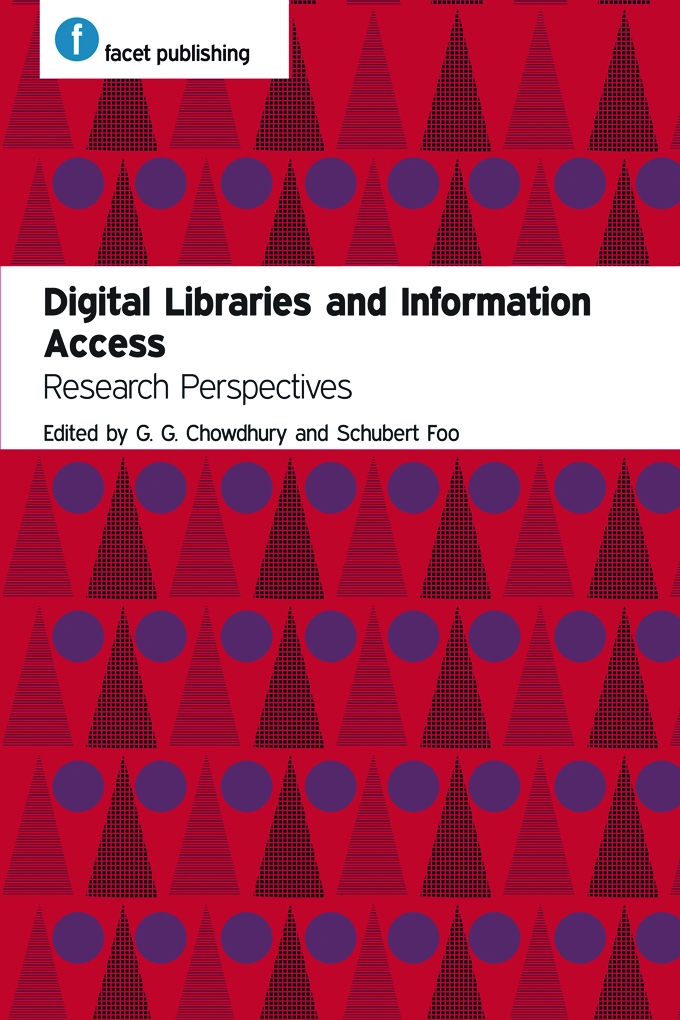Book contents
- Frontmatter
- Contents
- Foreword
- Editors and contributors
- 1 Digital libraries and information access: introduction
- 2 The design and architecture of digital libraries
- 3 Metadata and crowdsourced data for access and interaction in digital library user interfaces
- 4 Information access
- 5 Collaborative search and retrieval in digital libraries
- 6 The social element of digital libraries
- 7 Towards socially inclusive digital libraries
- 8 Users’ interactions with digital libraries
- 9 Digital libraries and scholarly information: technology, market, users and usage
- 10 Digital libraries and open access
- 11 iSTEM: integrating subject categories from multiple repositories
- 12 The usability of digital libraries
- 13 Intellectual property and digital libraries
- 14 Digital preservation: interoperability ad modum
- 15 Digital libraries and information access: research trends
- Index
- Miscellaneous Endmatter
9 - Digital libraries and scholarly information: technology, market, users and usage
Published online by Cambridge University Press: 08 June 2018
- Frontmatter
- Contents
- Foreword
- Editors and contributors
- 1 Digital libraries and information access: introduction
- 2 The design and architecture of digital libraries
- 3 Metadata and crowdsourced data for access and interaction in digital library user interfaces
- 4 Information access
- 5 Collaborative search and retrieval in digital libraries
- 6 The social element of digital libraries
- 7 Towards socially inclusive digital libraries
- 8 Users’ interactions with digital libraries
- 9 Digital libraries and scholarly information: technology, market, users and usage
- 10 Digital libraries and open access
- 11 iSTEM: integrating subject categories from multiple repositories
- 12 The usability of digital libraries
- 13 Intellectual property and digital libraries
- 14 Digital preservation: interoperability ad modum
- 15 Digital libraries and information access: research trends
- Index
- Miscellaneous Endmatter
Summary
Introduction
In today's technology-driven society, the means by which information is conveyed to information seekers is changing in ways never before possible. It is interesting to note that medical professionals were one of the first groups of users to see the potential in mobile devices for information acquisition and access (Murray, 2010). Therefore, medical libraries were among the earliest adopters of mobile technology and digital library services. Initially, many libraries were slow to adopt mobile-device technologies and integrate them into their services because they did not know whether the use of these devices was merely another technology trend, quick to rise and even quicker to pass (Murray, 2010).
However, as it appears, mobile-device technology is here to stay and is rapidly becoming more and more streamlined. Completing tasks that were once only possible with a variety of devices, such as a personal computer, GPS devices and an MP3 player, is now possible through the use of one petite and portable mobile device. Additionally, the task of viewing web pages and viewing web information on mobile devices has become much more user friendly and is almost identical to viewing this same information on a personal computer.
Today's information seekers are unlike any that the information profession has ever encountered before. These users will often describe themselves as ‘dependent’ on technology. Technological advances like the internet have made users believe that any information they require at any given time can be instantaneously retrieved by merely clicking a button. In other words, this distinctive user believes it is possible to access all the information of the vast and endless universe anytime and anywhere. As an information professional how does one meet the needs of this type of user, while at the same time providing the same quality of services that the information profession has been trained to provide for well over a hundred years?
Luckily, technology has made possible a variety of advances that can be utilized by both the information professional and the recreational information user. A few examples of rapidly dispersing global technologies are e-journals, e-books, e-readers and other mobile technologies.
- Type
- Chapter
- Information
- Digital Libraries and Information AccessResearch perspectives, pp. 129 - 142Publisher: FacetPrint publication year: 2012



